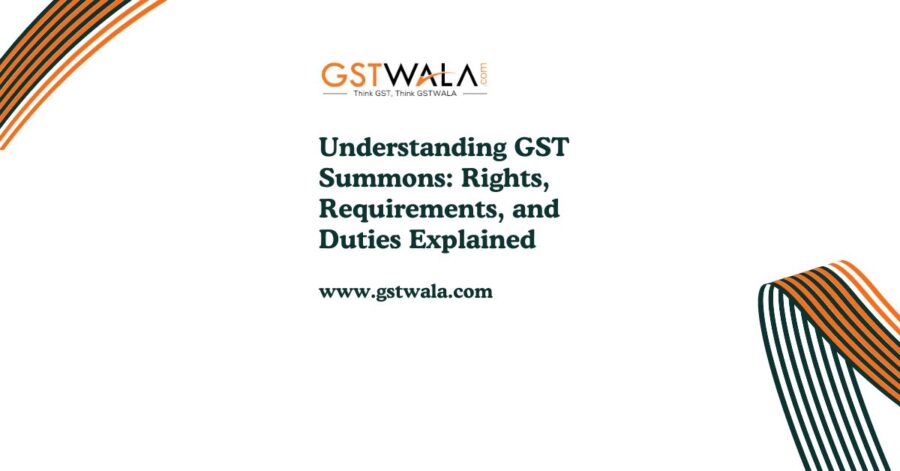
Understanding GST Summons: Rights, Requirements, and Duties Explained
This article delves into the intricacies of GST summons, providing a comprehensive overview of what they entail and their significance within the legal framework. It outlines the key requirements for a summons to be valid, elucidates the rights of individuals summoned under GST, and details the obligations of taxpayers when summoned. With clear explanations and practical insights, this article aims to enhance understanding of GST summons and their role in the taxation system.
What is a Summon? A summon, as per law, is a legal document issued by a court or government administrative agency, mandating a specific person’s appearance at a designated time and place before relevant authorities for a particular purpose.
Understanding GST Summons under the GST Act 2017: Under Section 70 of the GST Act 2017, the proper officer possesses the authority to summon any individual deemed necessary for providing evidence or producing documents in inquiries, akin to civil court procedures outlined in the Code of Civil Procedure, 1908. It’s crucial to note that summoning individuals under GST follows a structured legal process.
Key Matters Initiated for Inquiry: GST officers can initiate inquiries into various matters, including incorrect input tax credit claims, wrongful GST refunds, non-payment or underpayment of GST liabilities, discrepancies in GST returns, and delays in filing statutory returns.
Requirements for a Valid Summons: For a summon to be legally valid, certain prerequisites must be met, including clear indication of purpose, prior written permission from appropriate authorities, and avoidance of overuse. Additionally, summon recipients must be relevant to the inquiry, ensuring focused and justified summoning.
Rights of the Person Summoned: Individuals summoned under GST possess several rights, including the right to retract statements, the right to remain silent, and the right to cross-examine statements made by others. These rights safeguard individuals during summon proceedings and ensure fair treatment.
Duties of a Taxpayer When Summoned: Taxpayers summoned under GST have specific responsibilities, including honoring the summon, submitting requested documents, providing accurate information, and adhering to legal procedures. Fulfilling these duties is essential for smooth conduct of summon proceedings.
Considerations While Appearing Against the Summon: When appearing against a summon, individuals should be aware of the consequences of their statements, as these may be used as evidence. They should provide truthful information, avoid concealment of material facts, and ensure compliance with legal requirements and procedures.
Recent Judgments and Legal Insights: Recent judicial rulings highlight important aspects of summon procedures under GST, such as limitations on directing payment stoppages and the jurisdiction of proper officers. These insights offer valuable guidance for both taxpayers and authorities involved in summon proceedings.
Conclusion: In conclusion, understanding GST summons is paramount for both taxpayers and authorities. By adhering to legal requirements, respecting rights, and fulfilling duties, summon proceedings can be conducted effectively and fairly. This article underscores the significance of summon procedures in the GST system and emphasizes the importance of adherence to legal principles for all parties involved.
Top of Form
Need GST Help?
We are an email away info@gstwala.com
